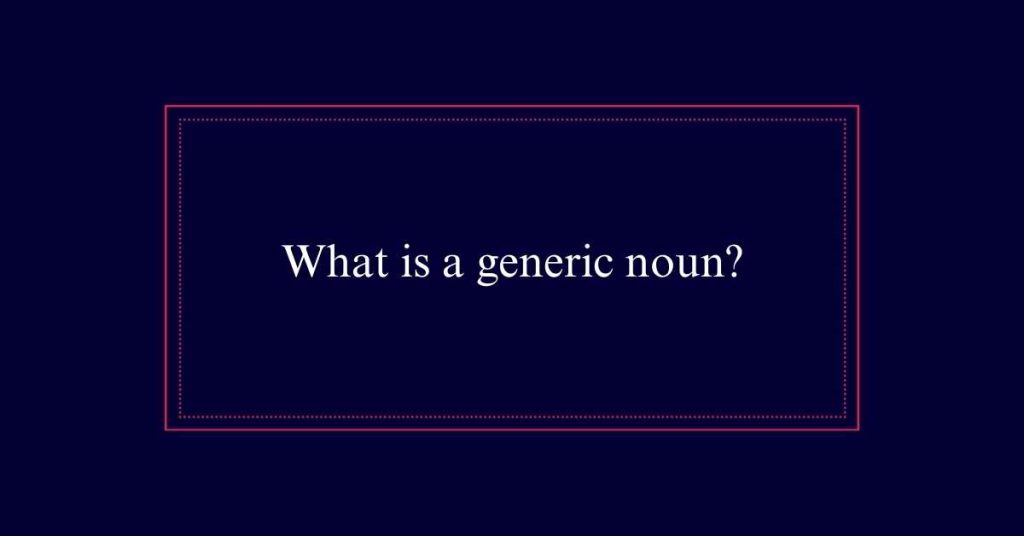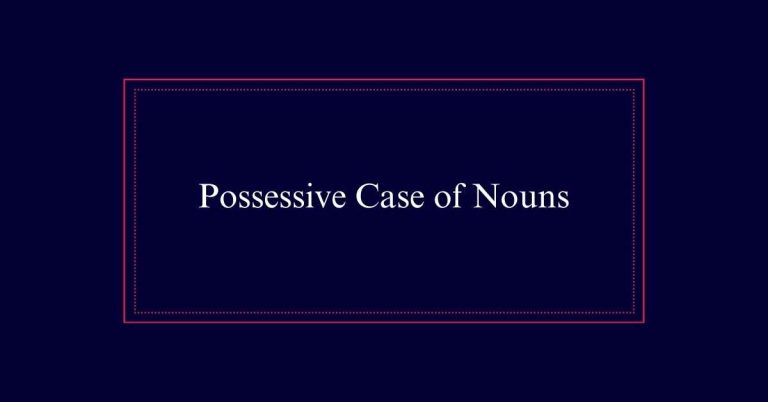What is a generic noun?
A generic noun refers to an entire category or group rather than a specific entity. These nouns generalize concepts, making them essential for broad discussions. Examples include “trees,” representing all kinds of trees, or “computers,” encompassing all types of computers.
Generic nouns are not capitalized unless starting a sentence and follow standard grammar rules. They can be paired with definite or indefinite articles and often appear in plural form without articles.
Definition of Generic Nouns
A generic noun refers to an entire group or concept as a whole. It represents all instances of a category, discussing a topic in general rather than specifying a single entity.
For example, the word ‘chimpanzees’ encompasses all members of that species. Generic nouns follow most grammar rules applicable to nouns. They serve to generalize rather than individualize, offering a broad perspective.
This type of noun is essential for making universal statements, such as ‘Dogs are loyal animals.’ By using generic nouns, speakers and writers can convey ideas that apply to every member of a group, providing clarity and inclusiveness.
This generalization is often vital for educational, scientific, and explanatory purposes, ensuring broad understanding.
Characteristics of Generic Nouns
Generic nouns possess several key characteristics that distinguish them from other types of nouns. They represent an entire group or concept, discussing topics in a broad manner.
Unlike proper nouns, which refer to specific entities and are capitalized, generic nouns are not capitalized unless they begin a sentence. These nouns follow standard grammar rules for nouns, including subject-verb agreement and pluralization.
Generic nouns can also be a subset of common nouns, but not all common nouns are generic. They can be used with definite or indefinite articles, depending on context. When pluralized, generic nouns do not require an article, adhering to the zero article principle. This promotes clarity and generality in communication.
Examples of Generic Nouns
In various contexts, generic nouns can effectively represent entire categories or groups. These nouns are essential for discussing topics in a broad sense. They provide a way to talk about general concepts without specifying individual instances. For example, in the animal kingdom, “dogs” can refer to all types of dogs, not just one specific breed or individual.
Here are some examples of generic nouns:
| Generic Noun | Category Represented |
|---|---|
| Trees | All types of trees |
| Cars | All kinds of cars |
| Books | All books in general |
| Computers | All types of computers |
| Birds | All bird species |
Generic Nouns in Sentences
Using generic nouns in sentences allows for clear and concise communication about broad categories or concepts.
For instance, when we say, ‘Dogs are loyal animals,’ we refer to all dogs, not a specific one. This generalization makes the statement universally applicable.
Similarly, saying, ‘Books provide knowledge,’ implies that all books have this quality.
Generic nouns help in discussing topics broadly without specifying particular instances. They follow standard grammar rules, making them easy to use.
The use of articles with generic nouns, such as ‘The computer changed the world,’ can emphasize the general impact of the noun.

Plural forms like ‘Violins are beautiful instruments’ eliminate the need for articles, maintaining clarity and simplicity in communication.
Comparing Generic and Proper Nouns
Proper nouns and generic nouns serve distinct purposes in language, each referring to different types of entities. Proper nouns, like ‘The Beatles,’ refer to specific people, places, or things and always start with capital letters. They are unique identifiers and do not overlap with generic nouns.
In contrast, generic nouns represent an entire group or concept. For example, ‘chimpanzees’ refers to all members of that species rather than a particular individual. Proper nouns are specific and unique, while generic nouns are broad and inclusive.
Understanding this distinction helps in correctly categorizing and using these nouns in sentences, ensuring clear and precise communication.
Generic Vs. Common Nouns
Generic nouns and common nouns both refer to people, places, or things, but they serve different functions in language. Common nouns are general terms for any member of a category, such as ‘cat’ or ‘city.’
Generic nouns, a subset of common nouns, represent all instances of a category, like ‘cats’ or ‘cities.’
Key differences include:
- Scope: Generic nouns cover all examples within a category, while common nouns can refer to a single entity.
- Usage: Generic nouns often discuss broad concepts or groups, whereas common nouns can be specific or general.
- Articles: Generic nouns may not always require articles, unlike common nouns which often do.
Articles With Generic Nouns
When discussing generic nouns, the use of articles plays a significant role in conveying the intended meaning. Generic nouns can be paired with definite or indefinite articles based on context.
For example, ‘The computer changed the world’ uses the definite article ‘the’ to refer to computers as a category that impacted the world. On the other hand, ‘A dog is a loyal pet’ uses the indefinite article ‘a’ to make a general statement about dogs.
Articles help differentiate between specific and generic uses. The choice of article depends on whether the noun refers to a specific instance or the entire category. Understanding this distinction is essential for accurate communication.
Using Plural Generic Nouns
Plural generic nouns are used to refer to all members of a category without needing an article. This approach simplifies sentences and gives a broad sense of inclusion. For example, ‘Dogs make great pets’ means all dogs, not just one.
When using plural generic nouns, the zero article principle applies, meaning no article is needed.
Benefits of using plural generic nouns include:
- Clarity: They clearly represent all instances of a category.
- Simplicity: They avoid the need for articles.
- Brevity: They make sentences shorter and more direct.
Subject-Verb Agreement
Guaranteeing subject-verb agreement is essential when using plural generic nouns. This means the verb must match the plural form of the noun.
For example, ‘Dogs bark’ is correct because ‘dogs’ is a plural noun and ‘bark’ is the correct plural verb form. Similarly, ‘Computers improve efficiency’ follows the same rule; ‘computers’ is plural, and so is ‘improve.’
Incorrect subject-verb agreement can confuse the reader and undermine the clarity of your writing. Always verify the verb aligns with the noun in number. This rule applies irrespective of the context in which the plural generic noun is used, maintaining grammatical consistency and enhancing readability.
Importance of Generic Nouns
Generic nouns play an essential role in language by allowing us to discuss groups or concepts in a general way. They enable us to communicate about broad categories without specifying individual members. This is important for several reasons:
- Clarity: Generic nouns help convey ideas clearly and succinctly by grouping similar items together.
- Efficiency: They reduce the need for repetitive naming of individual entities, making communication more efficient.
- Universality: Using generic nouns allows for broader applicability, making statements relevant to all instances within a category.
For example, saying ‘Dogs are loyal animals’ effectively communicates a general truth applicable to all dogs, without requiring references to specific breeds or individual dogs. This enhances understanding and streamlines communication.
Can you provide an example of a generic noun and how it relates to synonyms?
A great synonym for a generic noun is “animal”. Animals are a vast category of living beings, encompassing everything from household pets to wild creatures. Some synonyms for “animal” include “beast”, “creature”, and “critter”. This synonym definition and examples illustrate how synonyms can add variety and depth to our language.
Frequently Asked Questions
Can Generic Nouns Be Used in Idiomatic Expressions?
Yes, generic nouns can be used in idiomatic expressions. They help convey general truths or common experiences, making the expressions widely applicable and easily understood across different contexts. Examples include phrases like “a watched pot never boils.”
Are Generic Nouns Used Differently in Spoken Vs. Written Language?
Generic nouns are often used more loosely in spoken language, reflecting casual and immediate communication. In written language, their use is more precise and structured, following grammatical norms to guarantee clarity and formality.
How Do Children Learn to Use Generic Nouns?
Children learn to use generic nouns through exposure to language in everyday interactions. Parents and educators model their use in both spoken and written contexts, helping children understand general concepts and categories through repetition and contextual cues.







